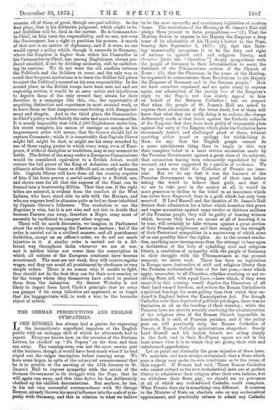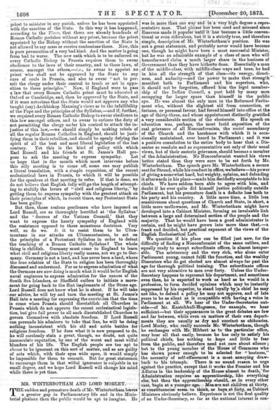THE GERMAN PERSECUTIONS AND ENGLISH SYMPATHIES.
L°RDRUSSELL has always had a genius for expressing the inconsiderate superficial impulses of the English public withan unhappy skill of which he afterwards had to repent. Everyone knows how, on the occasion of the Durham Letters, he chalked up ",No Popery" on the door, and then ran away. The running-away was not the most unwise part of the business, though it would have been much wiser if he had wiped out the vulgar inscription before running away. We have some hopes, in spite of the reiterated announcement that he is to preside at the meeting of the 27th January in St. Jaraes's Hall to express sympathy with the action of the German Government in its struggle with the Pope, that he will again run away, and this time before he has deliberately chalked up his childish denunciations. But anyhow, he has, in his not very successful correspondence with Sir George Bowyer, already thrown his moral influence into the scale of sym- pathy with Germany, and this in relation to what we believe to be the most unworthy and reactionary legislation of modern times. The resolutions of the Meeting at St. James's Hall will pledge those present to three propositions :—" (I), That the Meeting desires to express to his Majesty the Emperor a deep sense of its admiration of his Majesty's Letter to the Pope, bearing date September 3, 1873 ; (2), that this Meet- ing unreservedly recognises it to be the duty and right of nations to uphold civil and religious liberty, and therefore [note the "therefore "j deeply sympathises with the people of Germany in their determination to resist the doctrines of the Ultramontane section of the Church of Rome ; (3), that the Chairman, in the name of the Meeting, be requested to communicate these Resolutions to his Majesty the Emperor of Germany and to the German people." Now we have ourselves expressed, and are quite ready to express again, our admiration of the stately tone of the Emperor's reply to the Pope's not less stately appeal to him on behalf of the German Catholics ; but we suspect that when the people of St. James's Hall are asked to express their admiration of the letter itself, few of them will know that what they are really doing is to endorse the charge deliberately made in that letter against the Catholic subjects of the Emperor that they have been guilty of treasonable plots against the unity of the Empire, which plots the Catholics have etrenuously denied, and challenged proof of them, without receiving either proof or apology for withholding it. Now, we say, that the English people cannot do a more mischievous thing than to imply in this way their complete belief in a most serious accusation made by the Prussian Government against a great class of its subjects, that accusation haying been vehemently repudiated by the accused, and never supported by a particle of evidence. We by no means say that the Catholics of Prussia are inno- cent. But we do say that it was the business of the Prussian Government to bring proof of their ease before asking the world to believe their guilt, and that if we are to take part in the matter at all, it would be more generous to incline to the belief in an innocence which has never been disproved, than in a guilt which has only been asserted. If Lord Russell and the fanatics of St. James's Hall declare their admiration for a letter which launches this grave and vague accusation against some twelve or thirteen millions of the Prussian people, they will be guilty of bearing witness Which, because they have no means at all of knowing it to- be true, will certainly be false witness against a great section of their Prussian neighbours, and that simply on the strength of their Protestant sympathies in a controversy of which none- of us can possibly know the rights. As to the second resolu- tion, anything more incongruous than the attempt to base upon a declaration of the duty of upholding civil and religious liberty, a resolution of sympathy with the people of Germany in their struggle with the Ultramontanes at the present moment, we never read. There has been no legislation in Europe more destructive of civil and religious liberty than the Prussian ecclesiastical laws of the last year,—laws which apply, remember, to all Churches, whether receiving or not re- ceiving State aid, with equal force,—laws which, if they were enacted in this country, would deprive the Dissenters of all their hard-earned freedom, and reduce the Roman Catholics to a spiritual bondage far more galling than that which they en- dured in England before the Emancipation Act. For though Catholics were then deprived of political privileges, there was no limitation at all on the freedom of their worship ; while the Prussian laws are already actually rendering the administration of the religious rites of the Roman Church impossible in 'hundreds, it is said, of Prussian parishes, and if the policy. goes on, will practically strip the Roman Catholics of' Prussia of Roman Catholic ministrations altogether. Surely Lord Russell and his foolish friends are acting simply in the dark, and in their No-Popery spasm are not in the least aware what it is to which they are giving their rash and uninformed approbation.
Let us point out distinctly the gross injustice of these laws. We maintain, and have always maintained, that a State which pays a clergy may make its own conditions as to the terms of that support. If Prussia had said, Those Roman Catholics Who cannot submit to the new ecclesiastical laws are at perfect liberty to administer their religion after their own fashion, but we withdraw their State pay,' we should see no grievance at all of which any well-advised Catholic could complain. What Prussia does say is something very different. It reserves to the Minister of State an absolute veto on any ecclesiastical appointment, and practically refuses to admit any Catholic
priest to minister in any parish, unless he has been appointed with the sanction of the State. In this way it has happened, according to the Times, that there are already hundreds of Roman Catholic parishes without any priest, because the priest appointed by the Bishop without the sanction of the State is not allowed to say mass or receive confessions there. Now, this is pure persecution of a very bad kind. And the matter is going from bad to worse. The new oath which is to be enforced on every Catholic Bishop in Prussia requires them to swear obedience to the laws of their country, and to these laws, of course, amongst the others,—i.e., to swear to appoint no priest who shall not be approved by the State to any care of souls in Prussia, and also to swear "not to per- mit the clergy under their control to teach or act in oppo- sition to these principles." Now, if England were to pass a law that every Roman Catholic priest must be educated at Oxford or Cambridge, and, then be approved by the State, and if it were notorious that the State would not approve any who taught (say) Archbishop Manning's views as to the infallibility of the Pope and the principles of the Syllabus,—and if, further, we required every Roman Catholic Bishop to swear obedience to this law amongst others, and to swear to enforce the duty of not permitting the clergy under his control to attack the in- justice of this law,—we should simply be making rebels of all the regular Roman Catholics in England, should be justi- fying them in their rebellion, and should be openly defying the spirit of all the best and most liberal legislation of the last century. Yet this is the kind of policy with which Earl Russell and his friends at St. James's Hall pro- pose to ask the meeting to express sympathy. Let us hope that in the month which must intervene before this silly meeting is to come off, some one may publish a literal translation, with a simple exposition, of the recent ecclesiastical laws in Prussia, to which it will be possible for the speakers at that meeting to refer. If that is done, we do not believe that English folly will go the length of attempt- ing to stultify the lovers of "civil and religious liberty," by getting them to express sympathy with the greatest attack on their principles of which, in recent times, any Protestant State has been guilty.
But then, those zealous gentlemen who have imposed on Lord Russell, are so thoroughly horrified at the Syllabus' and the decrees of the Vatican Council,' that they want to express the hearty sympathy of England with the resistance opposed to these monstrous doctrines. Very well, so do we. is it to resist them to be Ultra- montane in our attacks on Ultramontanisra, to act on the principles of a Protestant Syllabus in order to defeat the teaching of a Roman Catholic Syllabus? The whole thing is childish. Germany must come to England to learn what civil and religious liberty really means, not we go to Ger- many. Germany is not a land, and has never been a land, where the true relation of the State to religion has been thoroughly discussed and understood. For us to express admiration of what the Germans are now doing is much what it would be for English naval engineers to express admiration for the canoes of the South Sea Islanders, or Sheffield cutlers to initiate a move- ment for going back to the flint implements of the Stone age. Lord Russell does not know what he is about. If he will take - our advice, he will try and turn the meeting at St. James's Hall into a meeting for expressing the convic:lon that the time is come when Prussia should disestablish all Churches in Prussia which do not approve the recent ecclesiastical legisla- tion, but give full power to all such disestablished Churches to govern themselves with absolute freedom. If Lord Russell can persuade his admirers to take that line, he will be doing nothing inconsistent with his old and noble battles for religious freedom. If he does what it is now proposed to do, he will carelessly stain a great, though, no doubt, not quite immaculate reputation, by one of the worst and most wilful blunders of his life. The English people are too apt to choose to be ignorant on this sort of matter, and so are guilty of acts which, with their eyes wide open, it would simply be impossible for them to commit. But for great statesmen to encourage them in that wilful ignorance is culpable in no small degree, and we hope Lord Russell will change his mind while there is yet time.











































 Previous page
Previous page